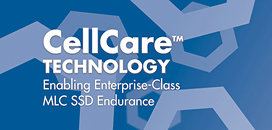- Joined
- Dec 6, 2011
- Messages
- 4,784 (0.96/day)
- Location
- Still on the East Side
STEC, Inc., a leading global provider of solid-state drive (SSD) technologies and products, today announced that the company has validated its proprietary CellCare Technology's ability to extend the endurance of 24 nm consumer-grade multi-level cell (cMLC) NAND flash memory to 40,000 program/erase cycles. This represents an increase of greater than 13 times the manufacturer's specified endurance metric of 3,000 program/erase cycles.
This is a significant advancement in one of the company's core technologies, as it provides for the development of a new generation of STEC's enterprise-class SSDs that utilizes low-cost cMLC NAND chips, while still achieving 10 full capacity random writes to the drive each day for five years, and data retention for three months (at 40°C)-all with no degradation in performance. This equates to approximately 7.3 petabytes (PB) of data being written to a 400 GB SSD over the life of the drive.

"The results of the 24nm cMLC endurance testing, performed at our San Diego R&D center, are testimony that the solid flash management algorithms and digital signal processing/ error correction code within our patented CellCare Technology bring true enterprise-class capabilities to consumer-grade flash memory," said Pablo Ziperovich, STEC's Vice President, Flash Channel Development. "We have now tested the use of lower-cost 24 nm cMLC NAND with our CellCare Technology to withstand the rigorous workload environments of enterprise storage applications-specifically, to provide for 40,000 program/erase cycles."
After applying STEC's CellCare Technology in combination with its fourth-generation ASIC-based SSD controller, STEC engineers performed a series of JEDEC -standard tests, including a program/erase endurance and data retention stress test; a stress-test-driven qualification of integrated circuits; and a SSD requirements and endurance test.
Results of the endurance testing are outlined in the table below:

"This announcement opens up a lot of new opportunities, as cost is king in NAND and SSDs," said Alan Niebel, founder and chief executive officer for Web-Feet Research, Inc. "Being able to take consumer-grade MLC NAND from 3,000 cycles to 40,000 cycles presents a huge leap in cost-effective enterprise endurance-enabling much more adoption."
"The intelligence embedded in STEC's SSD controller via CellCare Technology is truly remarkable," said Gregory Wong, founder and principal analyst for Forward Insights. "The dramatic endurance-extending capabilities of CellCare Technology on 24 nm consumer-grade flash will help accelerate the proliferation of cost-effective SSDs to the enterprise."
CellCare Technology is a proprietary combination of hardware and firmware working together to improve MLC flash performance and endurance throughout the life of the drive. Key endurance-extending features of this patented technology include:
● Flash parameter tracking per die, which delivers reduced and controlled wear;
● Flash management through the lifetime, which delivers reduced wear, controlled performance, improved performance, and lower write/read latency;
● Advanced error correction with digital signal processing to improve data reliability and require a minimum of re-reads.
CellCare Technology is embedded in STEC's full line of MLC NAND-based enterprise-class solid-state solutions, including its PCIe solid-state accelerators, ZeusIOPS SAS SSDs, and MACH16 SATA SSDs. STEC's 24 nm cMLC NAND flash-based SSDs are currently in development and testing, with production anticipated for later this year.
View at TechPowerUp Main Site
This is a significant advancement in one of the company's core technologies, as it provides for the development of a new generation of STEC's enterprise-class SSDs that utilizes low-cost cMLC NAND chips, while still achieving 10 full capacity random writes to the drive each day for five years, and data retention for three months (at 40°C)-all with no degradation in performance. This equates to approximately 7.3 petabytes (PB) of data being written to a 400 GB SSD over the life of the drive.

"The results of the 24nm cMLC endurance testing, performed at our San Diego R&D center, are testimony that the solid flash management algorithms and digital signal processing/ error correction code within our patented CellCare Technology bring true enterprise-class capabilities to consumer-grade flash memory," said Pablo Ziperovich, STEC's Vice President, Flash Channel Development. "We have now tested the use of lower-cost 24 nm cMLC NAND with our CellCare Technology to withstand the rigorous workload environments of enterprise storage applications-specifically, to provide for 40,000 program/erase cycles."
After applying STEC's CellCare Technology in combination with its fourth-generation ASIC-based SSD controller, STEC engineers performed a series of JEDEC -standard tests, including a program/erase endurance and data retention stress test; a stress-test-driven qualification of integrated circuits; and a SSD requirements and endurance test.
Results of the endurance testing are outlined in the table below:

"This announcement opens up a lot of new opportunities, as cost is king in NAND and SSDs," said Alan Niebel, founder and chief executive officer for Web-Feet Research, Inc. "Being able to take consumer-grade MLC NAND from 3,000 cycles to 40,000 cycles presents a huge leap in cost-effective enterprise endurance-enabling much more adoption."
"The intelligence embedded in STEC's SSD controller via CellCare Technology is truly remarkable," said Gregory Wong, founder and principal analyst for Forward Insights. "The dramatic endurance-extending capabilities of CellCare Technology on 24 nm consumer-grade flash will help accelerate the proliferation of cost-effective SSDs to the enterprise."
CellCare Technology is a proprietary combination of hardware and firmware working together to improve MLC flash performance and endurance throughout the life of the drive. Key endurance-extending features of this patented technology include:
● Flash parameter tracking per die, which delivers reduced and controlled wear;
● Flash management through the lifetime, which delivers reduced wear, controlled performance, improved performance, and lower write/read latency;
● Advanced error correction with digital signal processing to improve data reliability and require a minimum of re-reads.
CellCare Technology is embedded in STEC's full line of MLC NAND-based enterprise-class solid-state solutions, including its PCIe solid-state accelerators, ZeusIOPS SAS SSDs, and MACH16 SATA SSDs. STEC's 24 nm cMLC NAND flash-based SSDs are currently in development and testing, with production anticipated for later this year.
View at TechPowerUp Main Site

